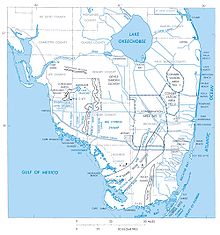Flamingo (Florida)
Flamingo is a small town in Monroe County in southeast Florida , in the middle of Everglades National Park on Florida Bay .
Originally, before the establishment of the national park, it was a small fishing village, which was connected to the next largest city, Florida City in the east, via a single road, the Old Ingraham Road. Traces of this road can still be found on the Anhinga Trail , which was once part of this road, and its continuation as the Old Ingraham Trail . This is approved for hiking and cycling. This old, historic street no longer exists; Instead, State Road 9336 runs from Florida City about 60 kilometers southwest to Flamingo.
Since the creation of the national park, the former commercial fishing in Flamingo has disappeared. Instead, a ranger station of the National Park Service (NPS) was built, as well as a campsite operated by the NPS with an adjoining amphitheater, where rangers give relevant lectures about the Everglades in the evening. But fishermen with their boats and fishing rods are still present at this place; Most of the time it is locals who arrive at the park entrance between 5 and 6 a.m. and take just under an hour's drive on the park road to find their luck fishing in the fishing grounds of Florida Bay.
A marina is operated commercially . Canoes (Canadians) and kayaks as well as boats with outboard motors and bicycles can be rented here and tours with larger ships such as the Pelican can be booked. Fuel for boats and cars is available, as well as camping supplies, relevant literature about the park, snacks, drinks, fruit and other food. There are also two hot water showers, which can be used by campers for a fee - a good alternative to the cold water showers at the campsite.
The busiest tourist times in the Everglades are the months November to March / April, i.e. the end and the beginning of the rainy season. The same goes for the flamingo itself; In the months of May to October there are seldom campers, and the otherwise due US $ 16 fee per night does not apply. During this time most of the facilities in Flamingo are closed; the ranger station is not manned; there are no park programs and only the small shop in the marina continues to offer its services. But the mosquitos and other insects like sand flies are a real nuisance. In the so-called dry season, however, the place awakens from its tourist hibernation; the activity of the mosquitoes decreases, but does not go out completely - mosquito repellent is always advisable.
The campsite is now also filling up with caravans and tents, until the climax is finally reached around Christmas and the turn of the year. Getting a place now without a reservation can be difficult, especially since parts of the campsite, loops B, C and D are closed.
As everywhere in the Everglades, the Flamingo also offers a diverse fauna and a very interesting natural landscape. Here, too, there are flat, wide areas with low vegetation and dense, high mangrove forests . Hiking trails lead to various locations in the local area such as the Christian Point Trail to the waters of Florida Bay.
Flamingo is one of the few places where both crocodiles and alligators live together.
Partial destruction and reconstruction
Until 2005 the Flamingo Lodge (a hotel), the Buttonwood (a restaurant), a number of cottages and the rental of houseboats were also operated. In 2005, the two hurricanes Katrina and Wilma caused massive damage to the lodge, the cottages and the amphitheater. The marina was also affected; Houseboats are currently no longer rented. The lodge and cottages were demolished.
A long-term discussion on how to rebuild began. Four possible solutions emerged, ranging from the status quo to the restoration of the facilities before they were destroyed to a contemporary reconstruction with ecological emphasis. This final draft, also called Alternative D , was provisionally finalized in August 2008 with the approval of the Everglades National Park Flamingo Commercial Services Plan .
The main points of this fourth alternative are:
- Construction of a lodge and a restaurant on a raised platform to protect against floods
- Erecting cottages on raised platforms to protect against floods
- Two new chickees in Florida Bay
- Electrical connections for the trailer area of the campsite
- Erection of Ecotents , quasi-stationary tents with solar cells
- Reintroduction of the houseboats
- New quarters for the staff of the Park Service and the commercial facilities
Web links
- Hiking trails in the Everglades National Park (English)
- Official site of the National Park Service (English)
- Flamingo Commercial Services Paln - Approved (English)
- Plans for the development of the park and to rebuild Flamingos (English)
- Information about Hurricane Katrina (English)
- List of hurricanes of 2005 (English)
Coordinates: 25 ° 8 ′ N , 80 ° 55 ′ W

